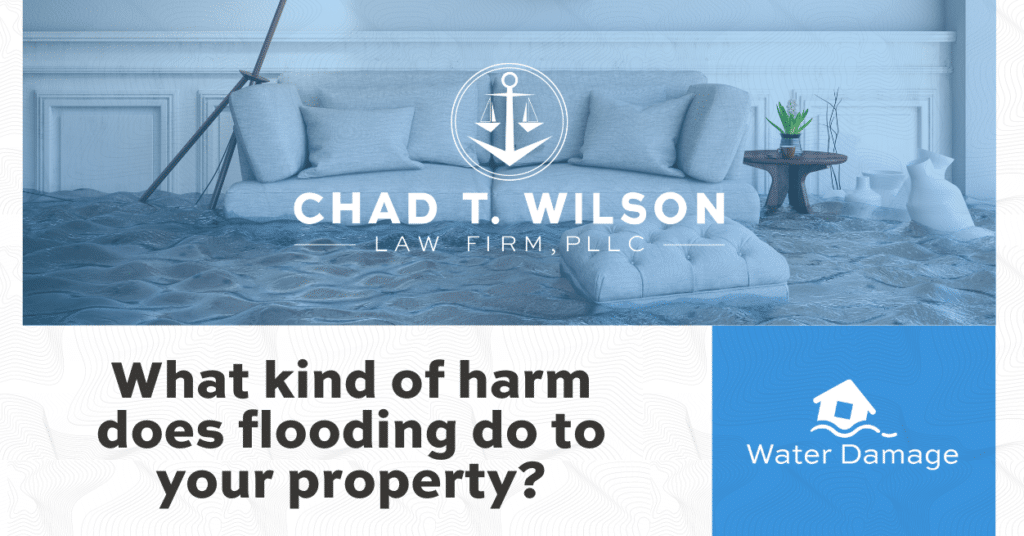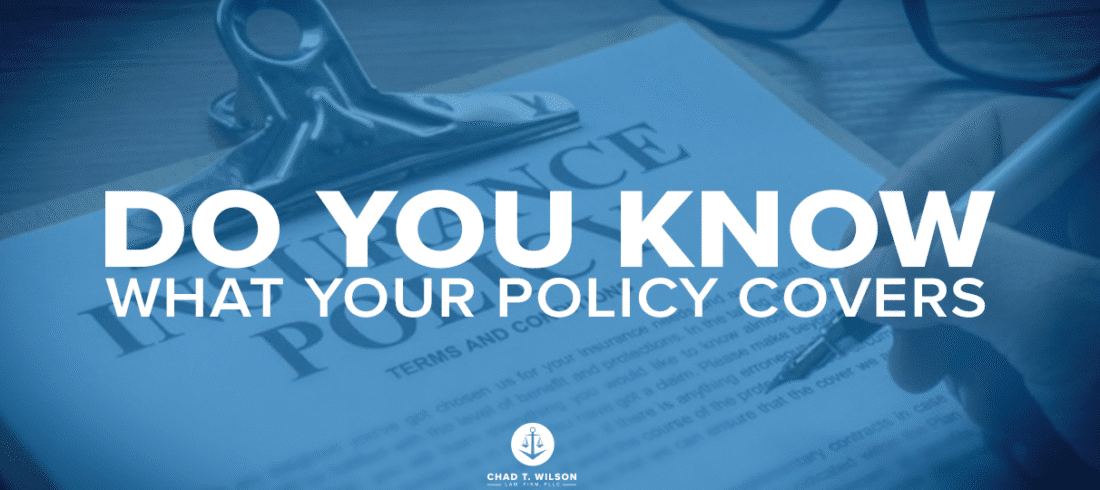Chad T. Wilson – News
August 3, 2023
Updated: August 3, 2023 12:30 p.m.
Source: www.cwilsonlaw.com
What kind of harm does flooding do to your property?

Most people are aware of the potential devastation that floods could do to cities and towns. If a flood damages your property, you can be forced to pay for costly repairs, depending on how bad the flood was. Everyone is susceptible to flooding, so being aware of the potential effects on your home and the precautions you may take to safeguard it will help you be more prepared.
How can a flood affect my property?
A flood can harm your property, from unstable floors to mold. However, property owners should walk around and physically inspect their property for structural damage and look for downed electrical lines or gas leaks before going inside to assess the damage. When you are unsure whether it is safe to enter the property or not, do not go inside.
Following a flood, you could discover the following types of damage at your house:
Electrical Problems After Water Damage
If the original water damage is not repaired, it could harm your electrical system as well as other gadgets and devices throughout the house. Damaged wiring may arc or result in power surges that could permanently break plugged-in equipment.
Enter your property only when the electricity has been completely turned off by the utility company, the fire department, or a licensed electrician. The only way to entirely disconnect the house from the grid is to remove the meter from the socket. Though someone is running a generator nearby and back-feeding electricity into the damaged electrical infrastructure, you could still be electrocuted in a flooded basement even though you’ve lost power.
Property Appliance Harm
Four Key Precautions: As you evaluate the damage, keep yourself and your family safe by:
1. Wait for a professional to inspect your appliances.
If there is moisture in the electrical components, this could short-circuit the device or, even worse, shock the user, posing a serious and even fatal risk of damage.
The best course of action is to wait until the water has subsided before unplugging any appliances that came into contact with the water during a flood. Avoid performing this while submerged in water. Nanni continues, “Don’t reconnect appliances until a certified technician has examined them.
2. Avoid using the HVAC.
According to the Centers for Disease Control and Prevention’s instructions for re-entering a flooded house, turning on your cooling (or heating) equipment can spread mold throughout your ductwork and home.
Before you turn on your system, have an HVAC expert with knowledge of mold cleanup evaluate it. The CDC states that “professional cleaning will kill the mold and stop future mold growth.” You can use your HVAC system to remove surplus moisture from your home once it is operational and has been determined to be safe.
3. Watch Out for Mold Inside
Your Freezer and Refrigerator.
When you arrive at your house, it’s a positive indicator if the refrigerator or freezer is still on. But that doesn’t necessarily mean the appliance is safe. Wet insulation will dry slowly after the device is powered on and running, which leaves it open to mold growth.
If the water in your kitchen climbed just a few inches, you might be in luck. According to Joe Pacella, the engineer who oversees CR’s tests of refrigerators and freezers, “the refrigerator’s compressor and condenser are sealed, and—unless it’s a built-in model—those parts are located at the bottom of the refrigerator.” “Because it’s higher up, the insulation is probably dry,” Given that it is significantly closer to the floor than the insulation in a refrigerator, the insulation in a chest freezer is most likely moist.
4. Keep an eye on the ice and water inside your fridge.
The icemaker and water dispenser on a refrigerator are connected to your water line. According to Greg Crite, manager of GE Appliances’ Technical Assistance Group, you should change the water filter in your refrigerator if you’ve been without water for a while or are currently under a boil alert. He also suggests the following actions to safeguard your health: Throw away your ice, run the ice-maker for an hour, flush the dispenser for three to five minutes, then clean and disinfect the bins.
Mildew and Mold
Mold can start to grow on any damp surface within 24 to 48 hours, according to the Federal Emergency Management Agency (FEMA). This means that after a flood, mold can impact your personal belongings, such as clothing and furniture, in addition to construction components like drywall, flooring, and insulation. Drying out your home and possessions as soon as you can is one way to aid in preventing the formation and spread of mold. The CDC advises opening the windows and using fans and dehumidifiers to aid in drying out the house if an electrician has confirmed it is safe to use the electricity.
Septic System and Well Water System Damage
The Environmental Protection Agency (EPA) warns that after a flood, septic tank filters may become clogged with debris, which will reduce the tank’s capacity to absorb water. After a flood, make a plan to have it tested and inspected as soon as you can. According to the EPA, flood water may also carry sediment that contaminates drinking water when it enters wells. Prior to consumption, be sure your water has been tested and, if necessary, treated.
What should I do if my home sustains flood damage?
You must promptly notify your insurer of your loss in writing, per your flood insurance policy’s requirements. To get the process started, get in touch with your flood insurance agent or the relevant flood insurance provider. The name of your insurance provider, your policy number, and your contact information will probably be required when filing a claim.
How to Respond if Your Water Damage Claim is Rejected
There are three things you should do if your insurance claim for water damage is rejected:
1. Call the insurance provider.
An insurance claim is handled by numerous departments within the insurance provider. Based on their personal beliefs, anyone could contest the assertion. It is crucial to get in touch with the insurance provider and learn the precise reasons why the claim was rejected
2. Request A Review.
Ask for the claim to be evaluated if you are unable to fix the problem. The insurance adjusters may get the answers to their inquiries and approve the claim through the review procedure.
3. Call Chad T. Wilsom Law Firm, PLLC.
Speak with a water damage attorney if you’re having trouble getting your claim processed or if the insurance company is attempting to pay less for the claim than is reasonable.
Learn more about our attorneys:
https://cwilsonlaw.com/meet-the-team-chad-t-wilson-law-firm-pllc-insurance-attorney/
Follow us on Social media:
https://beacons.ai/chadtwilsonlaw
Contact our Chad T. Wilson Law Firm Office Locations to Schedule a free Consultation.
Chad T. Wilson is an attorney whose firm specializes in property insurance disputes.
Written By:
Alejandro Caro



